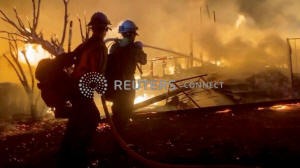Southern California blaze sears homes, orchards, threatens oil fields
 Send a link to a friend
Send a link to a friend
 [November 02, 2019]
By Steve Gorman [November 02, 2019]
By Steve Gorman
LOS ANGELES (Reuters) - A fast-moving scrub
fire threatened orchards, oil fields and homes while displacing
thousands of residents in Southern California on Friday, even as
diminishing winds helped fire crews tame a rash of wildfires elsewhere
across the state.
The latest in a spate of conflagrations that have kept California
firefighters on the go for weeks roared to life on Thursday evening near
the hilly farm community of Santa Paula, about 70 miles (112.65 km)
northwest of Los Angeles.
As the Maria fire raced across nearly 9,000 acres (3,642 hectares) of
dry brush and chaparral, firefighters scrambled to protect tens of
millions of dollars worth of citrus and avocado crops in harm's way, as
well nearby oil industry infrastructure.
The blaze also threatened high-voltage power lines in the vicinity,
along with radio and communications towers at the top of a large hill
called South Mountain, where the flames originated, Ventura County fire
officials said.

"There is still cause for caution and concern. We are not out of the
woods yet," county fire chief Mark Lorenzen told an evening news
conference. "We still have 24 hours of critical fire weather ahead of
us."
He said an estimated 1,300 firefighters, many from elsewhere in
California and the Western United States, were assigned to the blaze.
By sunset, the fire was threatening some 2,700 homes and other
structures, with roughly 10,800 people under evacuation orders, Sheriff
Bill Auyb told reporters.
No injuries were reported, but at least two homes were destroyed, county
spokeswoman Natalie Hernandez told Reuters by phone.
Oil production equipment at stake, belonging to California Resources
Corp, includes wells, pipelines, storage tanks and pumping plants,
Hernandez said, adding there was little vegetation immediately
surrounding those facilities.
"The oil fields have good fire clearance, so that works to their favor,"
she said.
The overall fire zone also encompasses a lemon and avocado crop valued
at between $95 million and $120 million, said Korinne Bell, the county's
chief deputy agricultural commissioner.
Preliminary assessments have found trees scorched and burned around the
perimeter of a number of orchards, though the full extent of damage has
yet to be determined due to limited access, Bell told Reuters.
She said avocado orchards are more susceptible to fire because they have
a higher oil content than citrus and accumulate more "leaf litter" at
the base of their trees, making them more flammable.
"There are a lot of avocados, but far more lemons, which is good news
because lemons don't burn as easily as avocados do," she said.
[to top of second column]
|

Firefighters direct water on a burning house during wildfires in San
Bernardino, California, U.S. October 31, 2019 in this screen grab
obtained from a social media video. 564FIRE via REUTERS

Crop inspectors also found many trees covered in flame-retardant
slurry dropped by firefighting airplane tankers during the day, she
said.
The fire erupted just as fierce Santa Ana desert gusts had begun to
subside after howling across much of Southern California for two
days. But strong, erratic winds were expected to persist through
Saturday in many mountainous and foothill areas, including the Santa
Paula fire zone.
Elsewhere, subsiding winds helped in gaining control of several
fires in the region that had broken out earlier.
Just 30 miles (48.28 km) to the east in Simi Valley, a blaze that
raged to the edge of the hilltop Ronald Reagan Presidential Library
on Wednesday was 60% contained on Friday, while containment on a
separate fire that had threatened the Getty Center art museum and
thousands of homes in west Los Angeles on Monday was listed at 66%
contained.
East of Los Angeles, the 200-acre (80-hectare) Hillside fire that
burned several homes early on Thursday in the north end of San
Bernardino was 70% contained by Friday.
The latest recurrence of seasonal Santa Ana winds coincided with
extremely low relative humidity levels and a prolonged lack of
rainfall that has left vegetation tinder-dry in the region.
While all the latest fires remain under investigation, wind-related
damage to power lines has been implicated in a number of major
California blazes, including the Getty fire.
Pacific Gas and Electric Co acknowledged last week that the Kincade
Fire, which charred 77,000 acres (31,160 hectares) of Sonoma County
wine country north of San Francisco, started last week near a
damaged PG&E transmission tower at about the time a high-voltage
line on that tower malfunctioned.
That blaze, which destroyed at least 349 homes and other structures,
was listed as 65% contained on Thursday evening.
(Reporting and writing by Steve Gorman in Los Angeles; Additional
reporting by Jonathan Allen in New York; Editing by Jonathan Oatis
and Sandra Maler)
[© 2019 Thomson Reuters. All rights
reserved.]
Copyright 2019 Reuters. All rights reserved. This material may not be published,
broadcast, rewritten or redistributed.
Thompson Reuters is solely responsible for this content.
 |